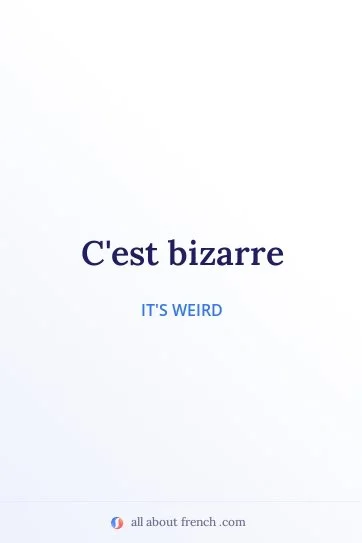
You are in the right place to find out all the things you want to know about the basic phrase "C'est bizarre". Including a complete definition of what it is and how you can use it in a casual conversation with an audio example.In addition, we also added some useful informations like slow pronunciation audio, synonyms, dialogue example and more!
Translation : It's weird
Register : Neutral - Basic
Slow
Normal
IPA : / sɛ bizaʁ /

The literal meaning is:
"C'est bizarre" is the common way to express "It's weird" in French and it's fine in most contexts.
Use it exactly like you would use "It's weird" in English. If you want something even more formal, you can say: "C'est étrange" (It's strange). But for something more informal, you can use instead "C'est chelou".
One example: you tell a friend that you had the same dream 5 days in a row, and you add: "C'est bizarre non ?" (It's weird no?). And your friend would answer: "Oui, c'est bizarre !" (Yes, it's weird!)
To highlight how weird this is, you can add the word "Grave" (Seriously) before the word "Bizarre" which makes the sentence informal. Or you can add instead "Très" (Very) or "Vraiment" (Really) to keep the sentence formal/neutral.
Examples: "C'est grave bizarre" (It's seriously weird) or "C'est vraiment bizarre" (It's really weird).
Dialogue
T'as vu ce qu'il s'est passé ?!
Did you see what happened?!
Ouais, c'est bizarre !
Yeah, it's weird!
Totally!
Learn French with Audio Stories
Learn French the easy way with our French - English
parallel texts with slow French audio
 Start Learning
Start Learning 